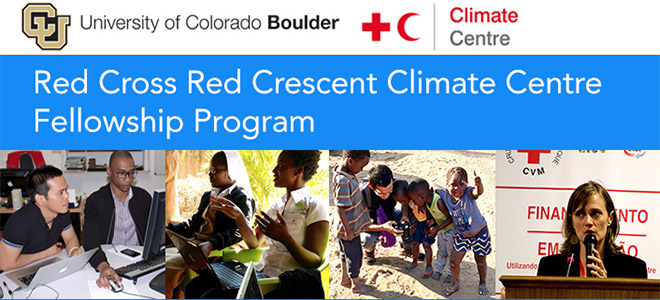
Improving Environmental Communication and Adaptation Decision-making in the Humanitarian Sector
Submit your application to redcross@colorado.edu
More Information
Application Deadline: Monday, March 4, 2019
CU-Boulder has partnered with the Red Cross Red Crescent Climate Centre (RCRCCC) to place graduate students in locations in eastern and southern Africa each summer. This collaborative program targets improvements in environmental communication and adaptation decision-making as well as disaster prevention and preparedness in the humanitarian sector. It connects humanitarian practitioners from the Red Cross/Red Crescent Climate Centre – an affiliate of the International Federation of Red Cross and Red Crescent Societies – with graduate student researchers at the University of Colorado who are interested in science-policy issues. Through this program we strive to accomplish three key objectives:
- to improve the capacity of humanitarian practitioners within International Federation of Red Cross and Red Crescent Societies network at the interface of science, policy and practice
- to help meet needs and gaps as well as work as a research clearing house in environmental communication and adaptation decision-making in response to climate variability and change, as identified through Red Cross/Red Crescent Climate Centre priorities and projects
- to benefit graduate students by complementing the classes and research that they undertake in their graduate program with real-world experience in climate applications and development work
The RCRCCC supervisors will liaise with specific IFRC field offices to identify potential projects and placements. Once projects are identified, RCRCCC supervisors will work with co-Director Max Boykoff, co-Director Fernando Briones and the student to design a scope of work. Projects can encompass, but are not limited to, topics such as the use of scientific information in decision making, communication of probability and uncertainty, perceptions of risk, and characterizing vulnerability and adaptive capacity. Placements in the field will address specific needs identified by IFRC field staff related to challenges of science communication and adaptation decision-making.
Participants will be required to write six blog posts from the field during this placement, give some presentations (e.g. in the CSTPR brownbag series) upon return, and complete a report at the conclusion of their fellowship detailing their experience and research outcomes.
$5,000 funding in total will be provided to offset expenses (in-country housing, food, airfare and in-country transportation). Expenses can vary widely depending on the location and nature of the placement. (RCRCCC) fellows will work with CU-affiliated travel agents to arrange round-trip airfare to their field site. Due to this $5,000 limit, applicants are encouraged to seek additional funds from alternate sources, as expenses can exceed this budgeted amount.
Application Details for Summer 2019
Criteria: Successful candidates will have a demonstrated interest in the Southern and/or East African regions, as well as demonstrated interest in one or both topic areas (environmental communication and adaptation decision-making), as evidenced by any of these elements: courses completed/underway, past work, volunteer and/or research experience, MS/PhD thesis direction.
Successful candidates must be self-starters and capable of adapting to independent working conditions. Students must have the consent of their graduate advisor to participate. A detailed terms of reference tailored to each fellow will be developed by the RCRCCC based upon their needs and the fellow’s skills in the months leading up to placement in the field.
1. Main application (submitted as one pdf file):
- Up to 1000-word statement about interest (geographic and/or topical) in the fellowship program, as well as a description of: a) how participation would fit into graduate study, b) previous experience and current skills would help to the RCRCCC to achieve its mission, c) preferred focus of work or topic of study, d) previous international experience and d) future career goals and objectives. Please be sure to specifically describe why and how the fellowship will be a mutually beneficial opportunity for both the CU student and the RCRCCC.
- Statement of availability between May and August 2019
- Current C.V.
- Unofficial transcript(s) from graduate work at University of Colorado Boulder
2. A one-page letter/statement from your graduate advisor, expressing support for your participation in this Fellowship program in summer 2019. Please have them email this to redcross@colorado.edu

